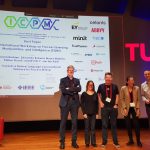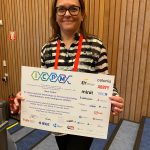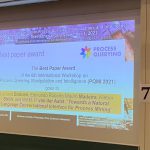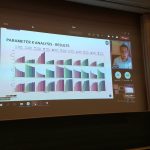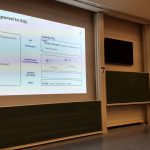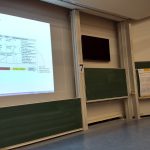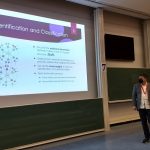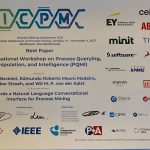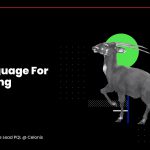The Sixth International Workshop on Process Querying, Manipulation, and Intelligence (PQMI 2021) aims to provide a high-quality forum for researchers and practitioners to exchange research findings and ideas on methods and practices in the corresponding areas. Process Querying combines concepts from Big Data and Process Modeling and Analysis with Business Process Intelligence and Process Analytics to study techniques for retrieving and manipulating models of processes, both observed and recorded in the real-world and envisioned and designed in conceptual models, to systematically organize and extract process-related information for subsequent use. Process Manipulation studies inferences from real-world observations for augmenting, enhancing, and redesigning models of processes with the ultimate goal of improving real-world business processes. Process Intelligence looks into the application of the representation models and approaches in Artificial Intelligence (AI), like knowledge representation, search, automated planning, reasoning, natural language processing, autonomous agents, and multi-agent systems, among others, for solving problems in process mining, that is automated process discovery, conformance checking, and process enhancement, and vice versa using process mining techniques to tackle problems in AI. Techniques, methods, and tools for process querying, manipulation, and intelligence have applications in Business Process Management and Process Mining. Examples of practical problems tackled by the themes of the workshop include business process compliance management, business process weakness detection, process variance management, process performance analysis, predictive process monitoring, process model translation, syntactical correctness checking, process model comparison, infrequent behavior detection, process instance migration, process reuse, and process standardization.
PQMI 2021 will be held in conjunction with the 3rd International Conference on Process Mining (ICPM 2021).
Follow us on twitter and visit the IEEE Task Force on Process Mining. This call for papers can be downloaded in the pdf format from here.
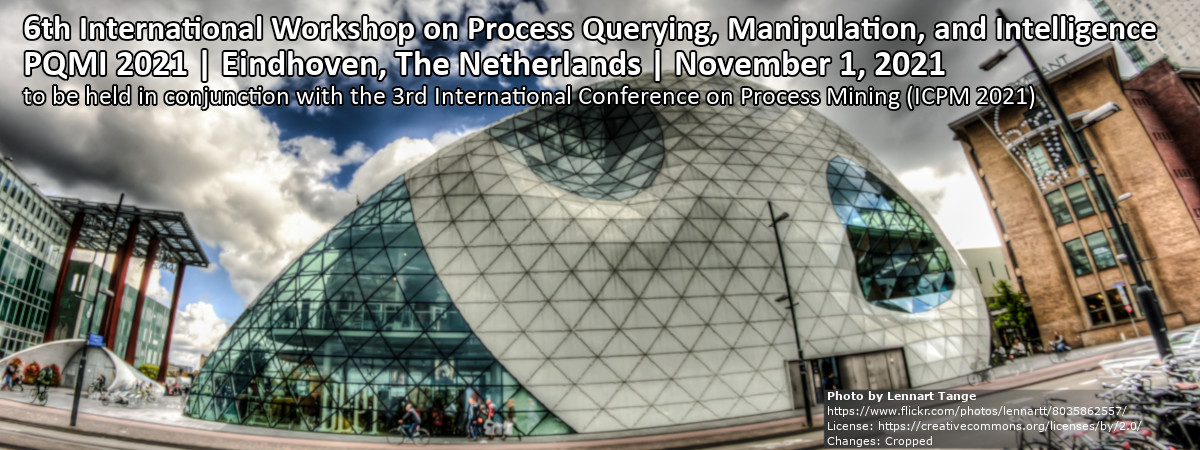
PROGRAM
To attend the workshop, please register here. You can register to attend the event physically on November 1, 2021, in Eindhoven, The Netherlands, or to join virtually via Zoom. All times are in CEST. The workshop will take place at the TU/e Campus, Eindhoven, the Netherlands, on November 1, 2021.
| Keynote (Celonis) – November 1, 2021, 14:00-15:00 – Venue Aud 7, Auditorium 5612 – Google Map | |
|---|---|
| 14:00-15:00 | Celonis PQL: A Query Language for Process Mining Jessica Ambrosy |
| Research track – November 1, 2021, 15:45-17:15 – Venue Aud 7, Auditorium 5612 – Google Map | |
| 15:45-16:05 | An Event Data Extraction Approach from SAP ERP for Process Mining Alessandro Berti, Gyunam Park, Majid Rafiei and Wil van der Aalst |
| 16:05-16:25 | Towards a Natural Language Conversational Interface for Process Mining Luciana Barbieri, Edmundo Roberto Mauro Madeira, Kleber Stroeh and Wil van der Aalst |
| 16:25-16:45 | On the Performance Analysis of the Adversarial System Variant Approximation Method to Quantify Process Model Generalization Julian Theis, Ilia Mokhtarian and Houshang Darabi |
| 16:45-17:15 | Discussion panel with the authors of the research papers |
PHOTOS OF THE WORKSHOP DAY
WORKSHOP TOPICS
The main topics relevant to the PQMI workshop include, but are not limited to:
- Case studies in process querying, manipulation, and intelligence
- Empirical evaluations of process querying, manipulation, and intelligence techniques
Process Querying:
- Domain-specific programming languages for process querying, including syntax, semantics, and notation
- Process mining methods for implementing process querying tasks, e.g., retrieval of process-related information
- Process querying methods for supporting process mining tasks, e.g., filtering and manipulating event logs
- Behavioral and structural methods for process querying
- Natural language querying for process querying
- Exact and approximate process querying methods
- Experience reports from implementations of process querying tools
- Event log and event stream querying
- Multi-perspective process querying methods, e.g., querying process resources, data, etc.
- Process querying of big (process) data
- Meta-models and architectures for process querying
- Applications of process querying methods for process compliance, standardization, reuse, etc.
Process Manipulation:
- Process querying for process redesign and improvement
- Evidence-based and online process repair
- Process correction, including label correction and log repair
- Process redesign and improvement using rich ontologies and real-world event data
- Process manipulations for ensuring privacy, anonymity, and quality
- Management of process model repositories
Process Intelligence:
- AI techniques for process discovery, conformance checking, and process enhancement
- Process mining techniques for tackling problems in AI, like search, reasoning, and knowledge representation
- Process mining artifacts as knowledge representations for solving AI problems
- Process mining and multi-agent systems
- Process mining and automated planning
- Simulation for event log generation
- Genetic algorithms for process mining
- Information retrieval methods for process mining
SUBMISSION INSTRUCTIONS
Prospective authors are invited to submit papers for presentation in any of the areas listed above. The paper selection will be based upon the relevance of a paper to the main topics as well as upon its quality and potential to generate relevant discussion. Authors are requested to prepare submissions according to the format of the Lecture Notes in Business Information Processing (LNBIP) series by Springer (http://www.springer.com/computer/lncs?SGWID=0-164-6-791344-0). Submissions must be in English and must not exceed 12 pages (including figures, bibliography, and appendices). Each paper should contain a short abstract, clarifying the relation of the paper with the main topics (preferably using the list of topics above), clearly state the problem being addressed, the goal of the work, the results achieved, and the relation to other work. Papers should be submitted electronically as a self-contained PDF file via the submission system (https://easychair.org/my/conference?conf=icpm2021). When submitting your paper, in the submission system, please select the name of the workshop track “Sixth International Workshop on Process Querying, Manipulation, and Intelligence.” Submissions must be original contributions that have not been published previously, nor already submitted to other conferences or journals in parallel with this workshop.
PUBLICATION
All workshop papers will be published by Springer as a post-workshop proceedings volume in the Lecture Notes in Business Information Processing (LNBIP) series. These proceedings will be made available to all registered participants approximately four months after the workshop, while preliminary proceedings will be distributed during the workshop. For each accepted paper, at least one author must register for the workshop and present the paper.
SPECIAL ISSUE
Authors of selected papers in PQMI 2021 will be invited to submit revised and extended versions of their work for a special issue in the Journal of Intelligent Information Systems (JIIS).
ORGANIZERS
- Artem Polyvyanyy, The University of Melbourne
- Claudio Di Ciccio, Vienna University of Economics and Business
- Sebastian Sardina, RMIT University
- Renuka Sindhgatta, Queensland University of Technology
- Arthur H. M. ter Hofstede, Queensland University of Technology
PROGRAM COMMITTEE
- Agnes Koschmider, Kiel University
- Amin Beheshti, Macquarie University
- Anna Kalenkova, The University of Melbourne
- Catarina Moreira Moreira, Queensland University of Technology
- Chiara Di Francescomarino, Fondazione Bruno Kessler-IRST
- Hagen Völzer, IBM Research – Zurich
- Han van der Aa, University of Mannheim
- Hye-Young Paik, The University of New South Wales
- Jochen De Weerdt, Katholieke Universiteit Leuven
- Kanika Goel, Queensland University of Technology
- María Teresa Gómez-López, Universidad de Sevilla
- Maurizio Proietti, CNR-IASI
- Minseok Song, Pohang University of Science and Technology
- Monika Gupta, IBM Research – New Delhi
- Pnina Soffer, University of Haifa
- Seppe Vanden Broucke, Katholieke Universiteit Leuven
- Shazia Sadiq, The University of Queensland
KEY DATES (Anywhere on Earth)
- Abstract submission deadline:
19 August 202126 August 2021 - Submission deadline:
26 August 20212 September 2021
- Notification deadline:
16 September 2021 - Camera-ready papers deadline:
30 September 2021 - Workshop:
1 November 2021
Contact details
Please forward all enquires to workshop (at) processquerying (dot) com.

